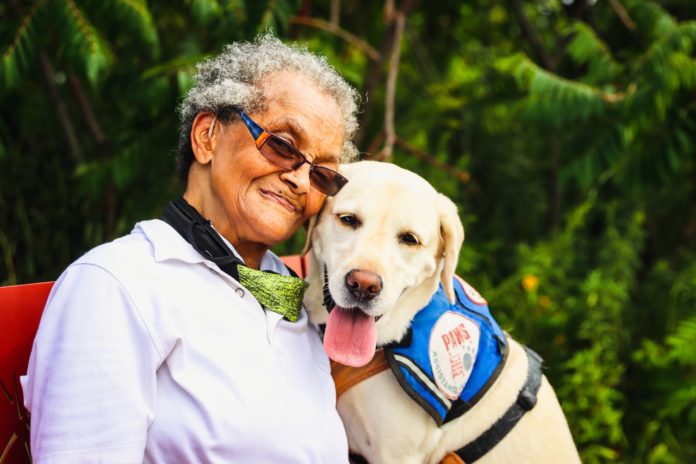Here’s some good news for dog lovers. Your furbaby isn’t just a family member anymore, it is also a bon therapist. As weird as it sounds, studies have shown that dog therapy is not just real but also beneficial in an array of conditions.
What is A Therapy dog?
Therapy dogs are pets that improve your health by providing emotional support. Anyone can train their dog to be a therapy dog to support themselves and others.
Therapy dogs live in people’s homes. They can also visit various places like retirement homes, nursing homes, schools, hospice homes, and hospitals.
They are gentle, friendly, and trained to accept hugs and petting from strangers. They are patient and will not be bothered by children who tug at their skin or by adults who want smaller ones to sit on their lap.
A therapy dog is a type of therapy animal. Other pets that can be used for emotional support include cats, rabbits, birds, horses, and even llamas and alpacas.
Difference Between Service Dogs and Therapy Dogs
You may have also heard of service dogs, but they are different from therapy dogs.
- Service dogs are trained to perform specific tasks on behalf of their owners. They undergo rigorous, high-level, task-oriented training specifically designed to help their owners cope with their disability. There are also laws established by the Americans Disabilities Act (ADA) that allows these dogs to accompany their owners in public places.
- Therapy dogs are sometimes called “comfort dogs.” They support a person’s mental health by providing care and comfort. Their gentle demeanor and unconditional love can have therapeutic benefits for people facing difficult health issues. However, unlike service dogs, anyone can benefit from therapy dogs.
How does Dog Therapy Work?

Certain mental health conditions and mental disorders are known to respond well to therapy dogs. Patients diagnosed with a variety of conditions, including depression, bipolar disorder, autism, ADHD, post-traumatic stress disorder (PTSD), and Alzheimer’s disease, benefit from interacting with therapy dogs and other pets.
Sometimes emotional challenges result from physical health issues, and therapy dogs can help with those. Studies show that patients recovering from a severe accident or a complicated surgery who participate in animal-assisted therapy may experience less pain. Studies show that such interactions can increase oxytocin, a hormone that stimulates mood, and decrease cortisol, the stress hormone.
Who Might Benefit from Dog Therapy?

The Pet Partners organization notes that dog therapy can improve many key markers of stress and disability, including:
- decreasing anxiety and stress
- decreasing perceptions of pain
- reducing feelings of fear or worry
- increasing feelings of social support
- providing motivation, stimulation, and focus
Review studies indicate that animal-assisted therapy appears to offer general physical and psychological health benefits. The evidence for animal-assisted treatment appears to be the strongest for markers of anxiety and depression in the general population.
The researchers say the treatment can benefit people of different ages with a variety of conditions. For example, a 2019 study found that the use of therapy dogs increased the effectiveness of mental health treatment in adolescents.
Together, these factors may make the therapy helpful for aspects of conditions such as:
- dementia
- depression
- anxiety
- autism spectrum disorder
- attention deficit hyperactivity disorder (ADHD)
- schizophrenia
Studies on the use of therapy dogs have shown that pet therapy can also help relieve symptoms of post-traumatic stress disorder (PTSD).
Some people in drug use disorder rehab reported being more receptive and happier when working with dogs.
Which Dogs Can be Therapy Dogs?

Any friendly breed can become a therapy dog with little training. Large dogs like Golden Retrievers, Standard Poodles, St. Bernards, and Labradors are commonly used as therapy dogs. However, if the dog and patient share a small space, smaller breeds such as Mini Poodles and Pomeranians are suitable.
A dog’s good attitude may partly be a function of its breed, but it depends on how the dog is trained, how evenly its temperament is developed, and how it responds to stimuli such as instruments such as canes and wheelchairs.
What Risks Can be Involved With Dog Therapy?
Pet therapy can help people with certain health conditions, but it may not be right for everyone.
Some people may have allergies to animals, which usually play a role in treatment. For example, many people are allergic to dander from dogs’ shedding. For these people, dog therapy can do a lot more harm than good.
Others may find the dogs frightening. They may not choose this type of treatment because it causes more stress.
Sometimes, a person can become attached to an animal quite quickly. This feeling can lead to possessiveness or even reduced satisfaction with the therapy.
Additionally, therapy dogs that visit hospitals and other long-term facilities can be carriers of certain infections and diseases. Comprehensive testing is important for all dogs as they can spread these infections to others.
Getting Your Own Therapy Dog

There are many online directories for more information on how to find a therapy dog to help you or a loved one. Find people and organizations near you by searching online for “therapy dogs” and the name of your city or town.
If you want to train your dog to be a therapy dog or visit an orphanage or other facility with your pet, do a web search for “therapy dog training” and the name of your city. You may also call or email the organization of your choice to confirm acceptance procedures.


